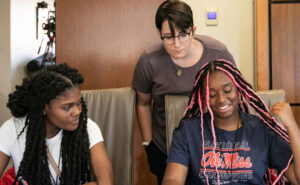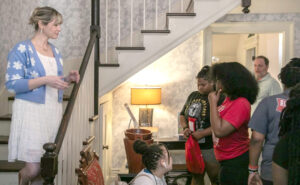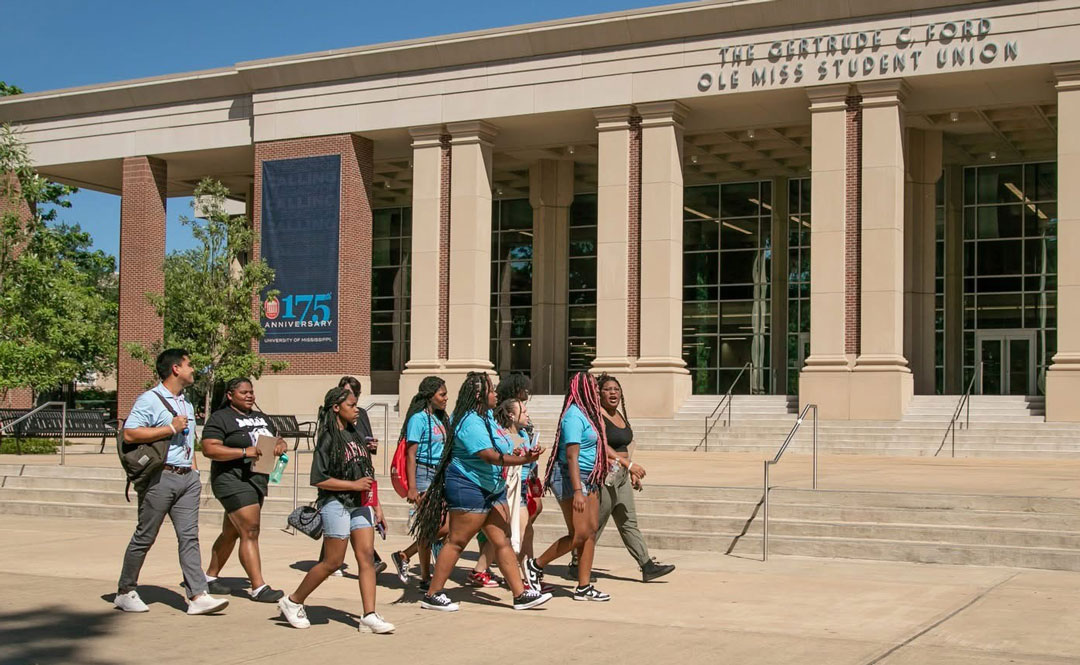The University of Mississippi is using a $300,000 grant from the Teagle Foundation to help underserved students experience and investigate the Good Life.
The Good Life program is part of the Teagle Foundation’s Knowledge for Freedom network. This new, pre-college program invites first-generation and rural high school students to campus to learn about the humanities and opportunities for a college education.

“This exciting program gives students a glimpse into the transformative power of higher education while exploring life’s most profound questions,” Chancellor Glenn Boyce said. “We are thankful to the dedicated faculty spearheading this effort to support first-generation students, serve under-resourced communities and school districts, and connect our humanities disciplines to the practice of citizenship, government, freedom and democracy.”
In 2024, funded through a planning grant from the Teagle Foundation, eight high school students from rural Mississippi school districts participated in a pilot program to study humanity’s deepest questions about leading lives of purpose, civic responsibility and what it means to live a good life.
Knowledge for Freedom programs, as demonstrated by the Freedom and Citizenship model program at Columbia University, have proven to dramatically improve college readiness, admission prospects and college graduation. They also help build interest in humanistic writing and issues, as well as habits of civic engagement that persist during and after college.
The question of what makes a good life – a quandary that has intrigued philosophers, writers and academics for centuries – was the central theme for eight high school students who participated in the Good Life pilot program last summer.
The initiative is led by the Office of Pre-College Programs in partnership with the College of Liberal Arts and the Office of the Provost’s Flagship First-Gen program. It draws perspectives from philosophy, English, history and other humanities disciplines to encourage rural and first-generation students to explore the role that humanities and civic engagement play in determining quality of life.
“The University of Mississippi embraces its public flagship mission of inspiring and educating our communities so that all individuals can intellectually, socially and culturally thrive through transformative experiences on our campus and beyond,” said Noel Wilkin, University of Mississippi provost.
“Establishing a Knowledge for Freedom program removes barriers for first-generation students who do not often participate in programs of this caliber and creates a pathway to realizing a future through higher education.”
This aligns with the goals of the Teagle Foundation, said Andrew Delbanco, the foundation’s president.
“The Teagle Foundation believes that students from all backgrounds can be inspired by reading works that raise enduring human questions, and by debate and discussion with peers under the care of dedicated teachers,” he said. “We see this experience as essential to the mission of colleges and universities, and fundamental to meaningful work, effective citizenship and a fulfilling life.”
The program encourages participants to think big.
“I think students are already asking these questions themselves,” said Ashleen Williams, instructional assistant professor in the Office of the Provost and one of the program’s coordinators. “Our goal is to empower them to think boldly, to wonder and to ponder the big questions and problems of our world.
“The Good Life program uses a humanities education to empower our students to think critically about creative solutions to solve some of our most complex problems and to envision themselves as leaders in that process.”
The pilot program students took part in discussions and activities that challenged their understanding of happiness, goal setting and living a well-rounded life.
The participants attended sessions led by the Center for Practical Ethics, toured the University Museum, examined the role of community engagement in improving quality of life and visited Rowan Oak, home of Nobel Prize-winning author William Faulkner. During the school year, mentoring sessions and workshops offered them meetings with local businesses, opportunities for community service, and information about college and career-related topics.

“The outreach provided by the Knowledge for Freedom project is essential to our efforts to reach students and communities that have historically been overlooked and underserved,” said Lee Cohen, liberal arts dean. “A humanities education provides these students with more impactful ways to engage with the social challenges facing their communities than is provided by their available K-12 education.”
The full program will bring 15 rising juniors to Ole Miss for one week and 15 rising high school seniors for three weeks. They will experience the intensity of seminar-sized discussions taught by professors and focused on major works of philosophy and literature.
During their senior year, the students can access help with college applications and engage in civic initiatives inspired by the recognition that their lives are interconnected with those of others.
For Wendy Pfrenger, director of pre-college programs, that is the meaning of a good life: “Enjoying meaningful connections to the natural world, to the people around you, and to yourself – that’s the good life. Honestly – it enriches the lives of us as adults, getting to walk alongside this group of young people as they explore and discover these connections.”
By Bill Dabney/UM Foundation


